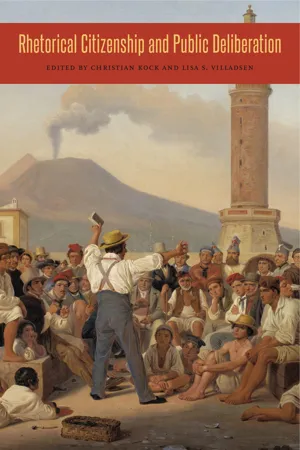
Rhetorical Citizenship and Public Deliberation
- English
- PDF
- Available on iOS & Android
Rhetorical Citizenship and Public Deliberation
About this book
Citizenship has long been a central topic among educators, philosophers, and political theorists. Using the phrase "rhetorical citizenship" as a unifying perspective, Rhetorical Citizenship and Public Deliberation aims to develop an understanding of citizenship as a discursive phenomenon, arguing that discourse is not prefatory to real action but in many ways constitutive of civic engagement. To accomplish this, the book brings together, in a cross-disciplinary effort, contributions by scholars in fields that rarely intersect.
For the most part, discussions of citizenship have focused on aspects that are central to the "liberal" tradition of social thought—that is, questions of the freedoms and rights of citizens and groups. This collection gives voice to a "republican" conception of citizenship. Seeing participation and debate as central to being a citizen, this tradition looks back to the Greek city-states and republican Rome. Citizenship, in this sense of the word, is rhetorical citizenship. Rhetoric is thus at the core of being a citizen.
Aside from the editors, the contributors are John Adams, Paula Cossart, Jonas Gabrielsen, Jette Barnholdt Hansen, Kasper Møller Hansen, Sine Nørholm Just, Ildikó Kaposi, William Keith, Bart van Klink, Marie Lund Klujeff, Manfred Kraus, Oliver W. Lembcke, Berit von der Lippe, James McDonald, Niels Møller Nielsen, Tatiana Tatarchevskiy, Italo Testa, Georgia Warnke, Kristian Wedberg, and Stephen West.
Tools to learn more effectively

Saving Books

Keyword Search

Annotating Text

Listen to it instead
Information
Table of contents
- COVER Front
- Copyright Page
- Table of Contents
- Introduction: Citizenship as a Rhetorical Practice (Christian Kock and Lisa S. Villadsen)
- SECTION I: Tracing Rhetorical Citizenship as Concept and Practice
- Chapter 1: Deliberative Democracy: Mapping Out the Deliberative Turn in Democratic Theory (Kasper Møller Hansen)
- Chapter 2: The Making of Truth in Debate: The Case of (and a Case For) the Early Sophists (Manfred Kraus)
- Chapter 3: The Search for “Real” Democracy: Rhetorical Citizenship and Public Deliberation in France and the United States, 1870–1940 (William Keith and Paula Cossart)
- SECTION II: Public Deliberation as Rhetorical Practice
- Part I: Considering Norms of Communicative Behavior
- Chapter 4: The Respect Fallacy: Limits of Respect in Public Dialogue (Italo Testa)
- Chapter 5: Dialectical Citizenship?Some Thoughts on the Role of Pragmatics in the Analysis of Public Debate (Niels Møller Nielsen)
- Chapter 6: Provocative Style: The Gaarder Debate Example (Marie Lund Klujeff)
- Chapter 7: Virtual Deliberations: Talking Politics Online in Hungary (Ildikó Kaposi)
- Part II: Critiques of “Elite” Discourse
- Chapter 8: Dis-playing Democracy: The Rhetoric of Duplicity (Kristian Wedberg)
- Chapter 9: Rhetoric of War, Rhetoric of Gender (Berit von der Lippe)
- Chapter 10: Speaking of Terror: Norms of Rhetorical Citizenship in Danish Public Discourse (Lisa S. Villadsen)
- Chapter 11: “This May Be the Law, But Should It Be?”: Tony Blair’s Rhetoric of Exception (Bart van Klink and Oliver W. Lembcke)
- Part III: Rhetorical Citizenship Across Communicative Settings
- Chapter 12: I Agree, But . . .: Finding Alternatives to Controversial Projects Through Public Deliberation (James McDonald)
- Chapter 13: Deliberation as Behavior in Public (Tatiana Tatarchevskiy)
- Chapter 14: Homing in on the Arguments: The Rhetorical Construction of Subject Positions in Debates on the Danish Real Estate Market (Sine Nørholm Just and Jonas Gabrielsen)
- Chapter 15: Danish Revue: Satire as Rhetorical Citizenship (Jette Barnholdt Hansen)
- SECTION III: Toward Better Deliberative Practices
- Chapter 16: Presidential Primary Debate as a Genre of Journalistic Discourse: How can We Put Debate into the Debates? (John Adams and Stephen West)
- Chapter 17: A Tool for Rhetorical Citizenship: Generalizing the Status System (Christian Kock)
- Chapter 18: Interpretive Debates Revisited (Georgia Warnke)
- About the Contributors
- Index
- COVER Back
Frequently asked questions
- Essential is ideal for learners and professionals who enjoy exploring a wide range of subjects. Access the Essential Library with 800,000+ trusted titles and best-sellers across business, personal growth, and the humanities. Includes unlimited reading time and Standard Read Aloud voice.
- Complete: Perfect for advanced learners and researchers needing full, unrestricted access. Unlock 1.4M+ books across hundreds of subjects, including academic and specialized titles. The Complete Plan also includes advanced features like Premium Read Aloud and Research Assistant.
Please note we cannot support devices running on iOS 13 and Android 7 or earlier. Learn more about using the app